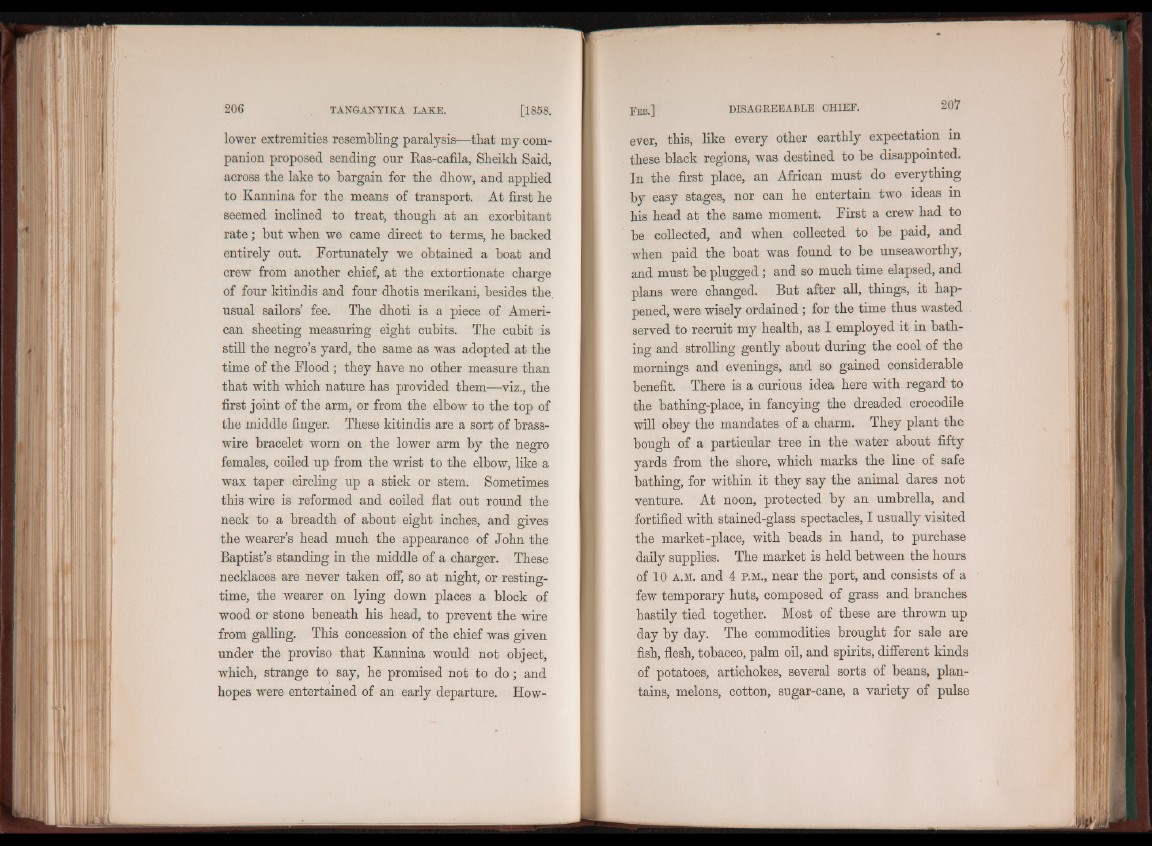
lower extremities resembling paralysis—that my companion
proposed sending our Eas-cafila, Sheikh Said,
across the lake to bargain for the dhow, and applied
to Kannina for the means of transport. At first he
seemed inclined to treat, though at an exorbitant
ra te ; but when we came direct to terms, he backed
entirely out. Fortunately we obtained a boat and
crew from another chief, at the extortionate charge
of four kitindis and four dhotis merikani, besides the.
usual sailors’ fee. The dhoti is a piece of American
sheeting measuring eight cubits. The cubit is
still the negro’s yard, the same as was adopted at the
time of the Flood ; they have no other measure than
that with which nature has provided them—viz., the
first joint of the arm, or from the elbow to the top of
the middle finger. These kitindis are a sort of brass-
wire bracelet worn on the lower arm by the negro
females, coiled up from the wrist to the elbow, like a
wax taper circling up a stick or stem. Sometimes
this wire is reformed and coiled flat out round the
neck to a breadth of about eight inches, and gives
the wearer’s head much the appearance of John the
Baptist’s standing in the middle of a charger. These
necklaces are never taken off, so at night, or restingtime,
the wearer on lying down places a block of
wood or stone beneath his head, to prevent the wire
from galling. This concession of the chief was given
under the proviso that Kannina would not object,
which, strange to say, he promised not to d o ; and
hopes were entertained of an early departure. However,
this, like every other earthly expectation in
these black regions, was destined to be disappointed.
In the first place, an African must do everything
by easy stages, nor can he entertain two ideas in
his head at the same moment. First a crew had to
be collected, and when collected to be paid, and
when paid the boat was found to be unseaworthy,
and must be plugged; and so much time elapsed, and
plans were changed. But after all, things, it happened,
were wisely ordained ; for the time thus wasted
served to recruit my health, as I employed it in bathing
and strolling gently about during the cool of the
mornings and evenings, and so gained considerable
benefit. There is a curious idea here with regard to
the bathing-place, in fancying the dreaded crocodile
will obey the mandates of a charm. They plant the
bough of a particular tree in the water about fifty
yards from the shore, which marks the line of safe
bathing, for within it they say the animal dares not
venture. At noon, protected by an umbrella, and
fortified with stained-glass spectacles, I usually visited
the market-place, with beads in hand, to purchase
daily supplies. The market is held between the hours
of 10 a .m . and 4 p .m ., near the port, and consists of a
few temporary huts, composed of grass and branches
hastily tied together. Most of these are thrown up
day by day. The commodities brought for sale are
fish, flesh, tobacco, palm oil, and spirits, different kinds
of potatoes, artichokes, several sorts of beans, plantains,
melons, cotton, sugar-cane, a variety of pulse